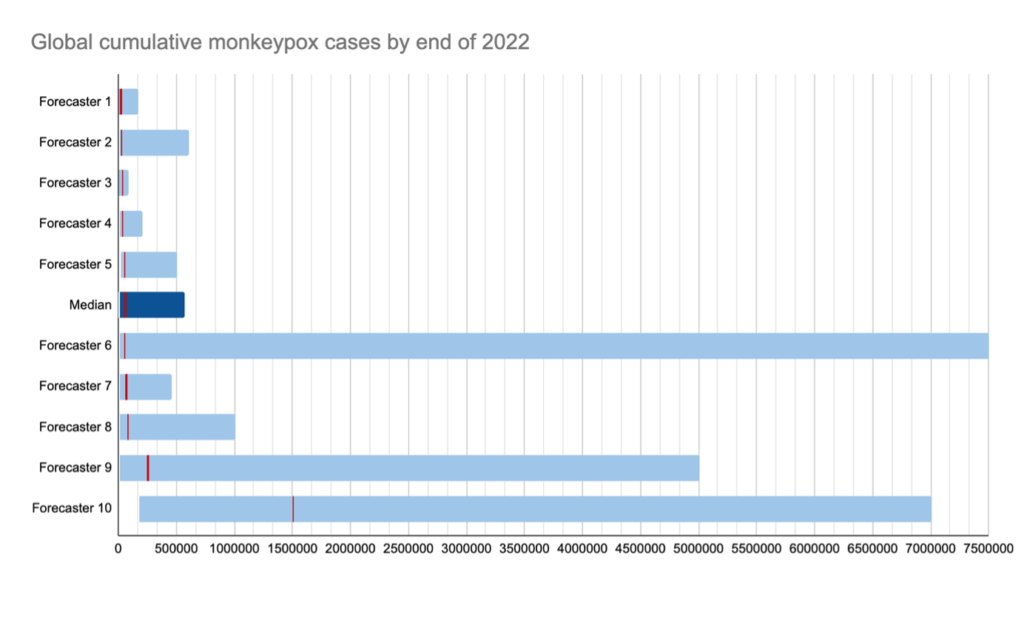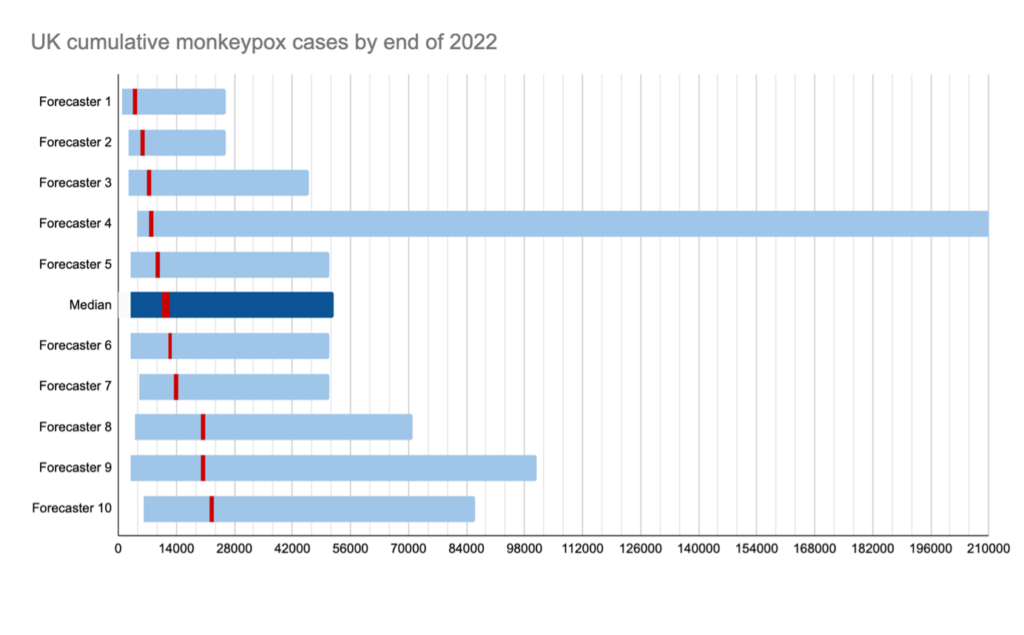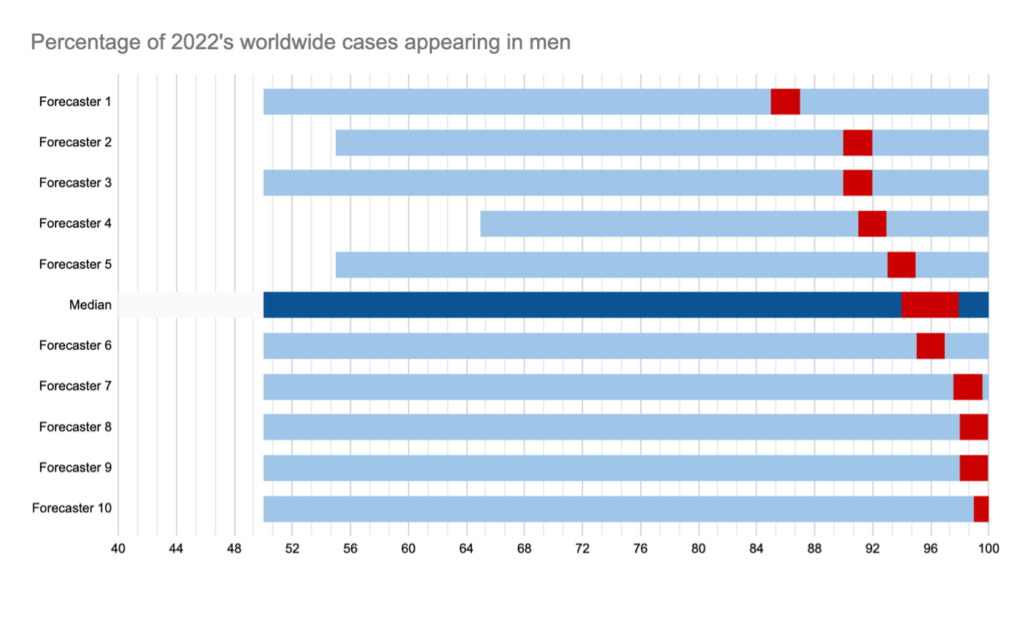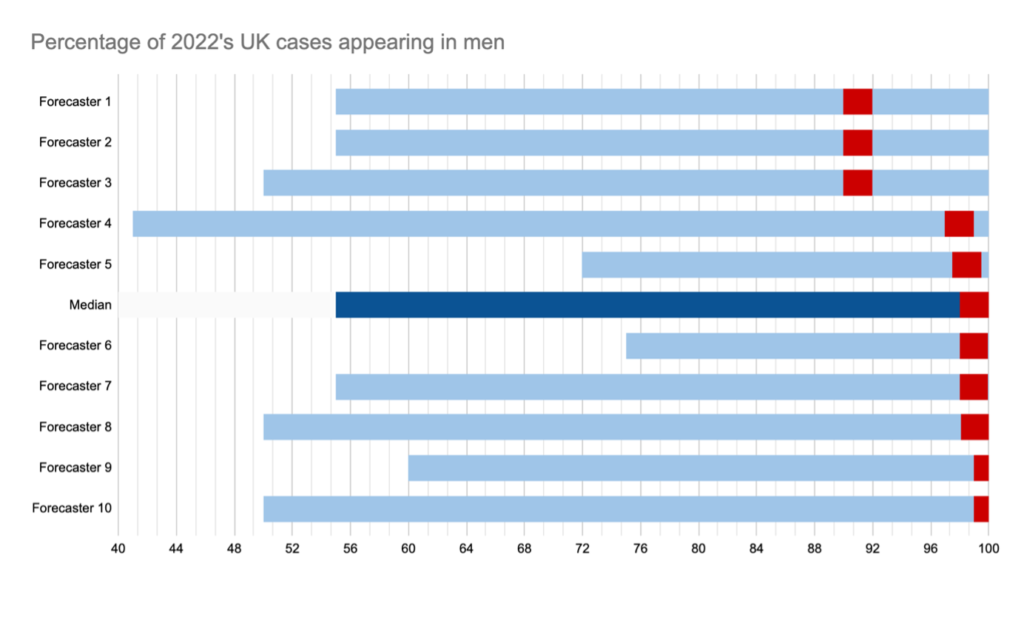Credit: Mohd Rasfan/AFP/Getty

Just as we were starting to put the two years of the pandemic behind us, the last thing anyone wanted to hear was that a new infectious disease was spreading unexpectedly. Yet this is exactly what has happened: towards the end of April 2022, cases of the viral disease monkeypox were detected in several countries around the world. By the end of May, 57 people had been diagnosed with the disease in the UK, and another 100 around 14 different countries.
However, the spread of monkeypox has been very different to the spread of Covid. While Covid is spread through the air, by droplets on patients’ breath, monkeypox is mainly spread by skin-to-skin contact. And because the initial outbreak arose among gay and bisexual men — many of the initial cases can be traced back to a Pride event in the Canary Islands, a sauna in Madrid, and other venues — the large majority of cases have, so far, been among men who have sex with men (MSM).
That said, the disease is not specific to gay men, or sexually transmitted in the strict sense of the word, and could reach the wider community. Even if it doesn’t, it’s important to get a sense of how far monkeypox could spread among MSM, and to try to minimise its damage and understand the scale of the public health problem. With that in mind, we gathered ten forecasters for a discussion of the likely outcomes of the monkeypox outbreak — to try to predict both the likely size of the outbreak, and how it will look: will it break out of the MSM community in large numbers?
A note on forecasting methods:
The classic “superforecasting” model requires forecasters to give a percentage probability for a certain outcome, such as “Britain will vote to remain in the EU, 66%”. Forecasting skill is graded on how well-calibrated those forecasts are — do your 66% forecasts come in 66% of the time? — and also how confident they are: getting a 90%-confident forecast right is rewarded more highly than getting a 55%-confident forecast right. (On the other hand, getting a 90%-confident forecast wrong is punished more severely than getting a 55%-confident forecast wrong.)
In this case, we do something similar, but, in a way, reversed. The forecasters gave a range of values that they thought was 80% likely to contain the true outcome. So, for instance, if one thought that it was 90% likely that the number of monkeypox cases in the UK before the end of 2022 would be higher than 500, and 90% likely that it would be lower than 10,000, their 80% range is 500 to 10,000.
They also each gave a 50% value, which you can most easily think of as their central, most likely estimate. The forecasters will be graded on whether their 80% forecasts come true 80% of the time, as usual, but instead of being rewarded for making higher-confidence predictions, they’ll be rewarded for giving narrower ranges. For each question, we also gave a median of the forecasters’ 10%, 50% and 90% predictions — that is, if you took all 11 predictions and put them in a row from smallest to largest, we’d take the one in the middle.
The questions:
How many cases of monkeypox will there have been worldwide by the end of 2022?
- Median 10% estimate: 13,500
- Median 50% estimate: 45,000
- Median 90% estimate: 525,000

As of 17 June, there have been 2,103 laboratory-confirmed cases of monkeypox reported to the WHO. The forecasters think that even in a realistic best-case scenario, that number will only be a fraction of the eventual total: the median 10% (that is, low-end) estimate is six times higher. On the other hand, the median upper-end estimate, while a large number — more than half a million — is still negligible compared to the spread of Covid: by the end of 2020, there had been more than 80 million confirmed cases of Covid-19, and many times that number of undetected ones.
Yet it’s important to note that the forecasters’ predictions varied widely. Three of them pointed out that while the virus spreads through skin contact now and has a relatively low R number, it is mutating, and could easily become transmissible. One said: “Multiple somewhat distinct strains have already evolved, which leads me to be concerned that there is a fairly high amount of genetic drift occurring, which could lead to the situation turning into a more detrimental pandemic.”
Another said, citing this paper, that the virus seems to have a very high R within MSM communities, but an R below 1 outside it. (The R value is the number of people the average infected person goes on to infect.) But, they said, “as it spreads more the chance that it mutates to gain a transmissibility advantage increases, quite possibly via the airways”: as a result, that forecaster gave a 90th-percentile forecast of 30 million infections, the highest in the group by a factor of four.
Other forecasters were more optimistic. One thought that the total would be no higher than 80,000; another, 200,000. Another with a relatively low estimate (median 40,000, 90th percentile 400,000) pointed out that “there has been limited transmission beyond networks of close contacts, so far”. Another, who had a very wide range (from 12,000 to 5 million) said: “R is clearly lower than for Covid, so there clearly is a plausible future where once governments get serious about mitigation it ceases to spread quickly. On the other hand, well, they might not.”
It’s worth noting that these estimates are of the total cases, not just the confirmed ones. (One forecaster said they “expect much of the world is vastly undercounting”.) This means it will be impossible to accurately grade who has got this question right.
How many cases of monkeypox will there have been in the UK by the end of 2022?
- Median 10% estimate: 6,000
- Median 50% estimate: 22,000
- Median 90% estimate: 85,000

As with the worldwide estimates, there was considerable spread. One — the same person who gave a high-end estimate of 30 million in the first question — used the same reasoning to say numbers could get as high as one million in the UK.
On the whole, though, the feeling among the forecasters was that the UK is better placed to control spread than most countries are. “UK monitoring is on the better end,” said one, “and there are initial attempts to vaccinate.”
But there were concerns. “It’s failed to be controlled particularly well so far, despite good monitoring,” one wrote. “It’s on the worse end of what experts would have hoped for a month ago, perhaps because of long incubation periods. There’s still a lot of opportunity for superspreader events, especially given Pride, and relatively little cautiousness so far. But awareness within LGBT communities should slow it down.”
As with the “worldwide” question, the forecasters were talking about the true number of cases, not confirmed cases. However, the monitoring in the UK is likely to be pretty comprehensive, so the two numbers should be comparable.
What percentage of 2022’s worldwide cases will be in men?
- Median 10% estimate: 50
- Median 50% estimate: 94
- Median 90% estimate: 99

At the moment, more than 99% of recorded monkeypox cases worldwide have been among men, suggesting that the spread has been almost exclusively among MSM. The forecasters, on the whole, expected that to remain the same, although they felt that there was a distinct chance, above 10%, that it could spread so rapidly among the general population that it could wash out the male head start altogether. One pointed out that once a disease gets outside the subpopulation in which it started, it can behave very differently depending on the context: “The US currently has a 5:1 male/female ratio of HIV,” wrote one, “while Sub-Saharan Africa has more women with AIDS than men. The modes of transmission do not keep the straight community safe. There are far more straight people than gay people, so once it starts to increase in that community, the potential population is much greater.”
Another forecaster thought that this is essentially the same question as the case-numbers question, somewhat repackaged. If it starts to spread very rapidly, by some other method than skin-to-skin contact, then it will spread outside MSM communities: “I think this is essentially the same as asking the chances it mutates to become more transmissible and spread outside of the networks it’s currently spreading through. It’s very hard for me to estimate this risk, but I think it increases as the case numbers increase.”
All 11 forecasters thought there was at least a 10% chance that cases among women would reach close to 50% of the total, but most thought that that was unlikely: only one put their central estimate at below 90% male, and four had it at 95% or higher.
What percentage of 2022’s UK cases will be in men?
- Median 10% estimate: 55
- Median 50% estimate: 98
- Median 90% estimate: 99

The forecasters felt the story was likely to be largely similar in the UK to worldwide, with some caveats. First, they felt the disease was likely to be better controlled here and to spread more slowly, so the chance of it spreading widely outside MSM communities was smaller, hence the higher median 10% estimate. Second, one noted that the UK’s HIV population has a higher male-to-female ratio than the global average, and used that to extrapolate to monkeypox.
Overall, the forecasters’ attitude can be summed up in this comment: “I think community spread is definitely possible, but founder effects and (reasonably) slow spread will mean the MSM community will still dominate the numbers by the end of the year.” One added that the UK government’s current strategy, of vaccinating high-risk MSM, is very good, and “may solve the problem on its own”. However, they added that public messaging at the moment is not especially useful, since it doesn’t warn at-risk communities, tending to emphasise the risk to wider society rather than to MSM groups. Changing that would, they said, be worthwhile.
Conclusions:
The forecaster group, on the whole, felt that monkeypox will continue spreading, both in the UK and worldwide. However, unless it mutates significantly to become capable of spreading in ways other than through skin contact, they felt that its numbers were likely to remain comparatively low, and that it was most likely to stay chiefly in the MSM community.
Yet they also felt there was a significant tail risk of a much wider impact. They noted that a novel disease which appears to be mutating relatively rapidly has a non-negligible chance of achieving new means of spreading — and that there was a greater than 10% chance of widespread transmission among the wider population, with hundreds of thousands or even millions of cases not unlikely.
***
A version of this research first appeared on the Swift Centre.










Join the discussion
Join like minded readers that support our journalism by becoming a paid subscriber
To join the discussion in the comments, become a paid subscriber.
Join like minded readers that support our journalism, read unlimited articles and enjoy other subscriber-only benefits.
Subscribe